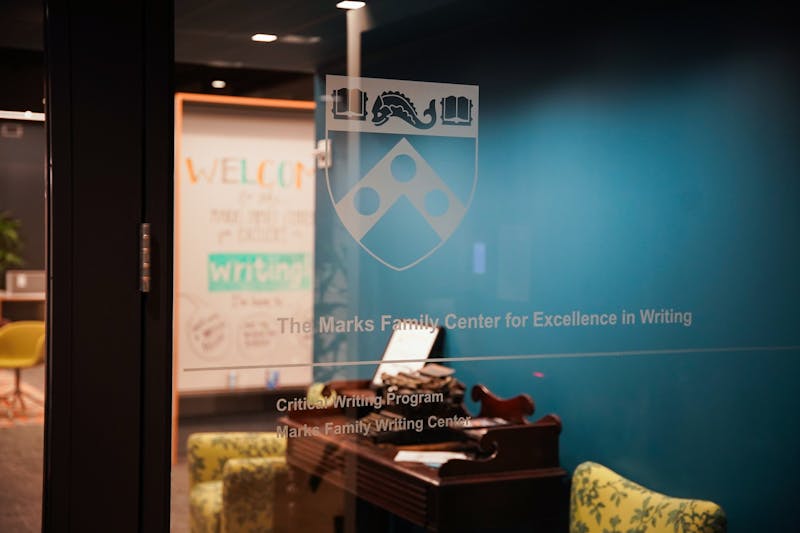
Senior wide receiver Rory Starkey Jr. catches a pass in the end zone for a touchdown during a game against Princeton on Nov. 20.
Credit: Anna VazhaeparambilSince Penn football coach Ray Priore was promoted to the top job for the 2014 season, his teams have steadily gotten worse throughout the years.
In 2015 and 2016, the Quakers tied for the best record in Ivy League play with Harvard/Dartmouth and Princeton, respectively. Now in 2021, the Red and Blue just finished with their worst Ivy League record (1-6) since 1981, after losing 34-14 to Princeton in the season finale.
This downward trend begs a burning question. What should Penn football do from here?
I’m here to analyze what went wrong this season, and how Penn football might address these problems in the offseason and next season.
The first glaring issue is the offense: it was pitiful this season, averaging 19.1 points per game — good for last in the Ivy League. In my opinion, the offense shined brightest with aggressive play calls, especially first-down passes. Successful chunk plays through the air forced the opposition's defense to position themselves further down the field, creating more space in the box for Penn's run game.
One would expect freshman quarterback Aidan Sayin to look more composed and comfortable as the game progressed, but instead, he looked overwhelmed by Princeton’s defensive packages and blitzes. A one-dimensional offense and long-developing plays did not help Sayin, who was either being pressured or sacked all day.
Priore should be applauded for his quarterback change midway through the season, which saw injured senior John Quinnelly replaced by Sayin. Throughout his five starts, Sayin consistently showcased his raw throwing ability on the field, zipping balls past defenders in the middle of the field.
However, Sayin certainly needs time to develop as the maestro of the offense, and he must learn how to limit costly errors, such as interceptions or sack-fumbles. Giving a freshman playing time is rare for Priore — it's likely he realized that Penn had no chance at a title this year, and that providing Sayin with experience would be better for the offense in the long run.
While looking to the future makes sense, you still want to coach to win. Opting to punt on a fourth and 1 in a game against Princeton that was purely for pride is not aggressive offensive play-calling. Priore’s reluctance to go for it on fourth down is puzzling, especially as the entire NFL is going for it on fourth down at record rates.
Moreover, this questionable play-calling is not isolated to one or two cases. The game-changing play in the Princeton matchup was a pick-six by Sayin, when the freshman quarterback attempted an out route to the right sideline from the left hash. Even Tom Brady throws interceptions with play design like that.
Another head-scratching call was when Penn ran a screen from its own goal line against the Tigers. Luckily, graduate student running back Isaiah Malcome dropped the pass; otherwise, he would’ve caught the ball in the end zone and been tackled for a safety.
I think the key to the future is being realistic. You can deceive yourself all you want about Penn football’s Ivy League title chances if that’s how you get yourself motivated to visit Franklin Field, but the Quakers were never in the hunt for a conference title this season.
Next year won’t be any different.
One might argue that Priore needs a few more years to transform the program to allow more of his latest recruits to hit the field. But, all signs point to Penn football getting worse and not better in the near future, at least in terms of what the team can do externally.
Internally, the team and its players need to determine which seniors will possibly be returning. Penn is set to graduate an extremely strong class, including wide receivers Ryan Cragun and Rory Starkey, Jr., running backs Trey Flowers and Malcome, defensive backs Mohammed Diakite and Jason "Paul" McCleod Jr., and linebacker Jake Heimlicher.
If Penn decides to return a majority of these players, of course that benefits the team in the short term. With veteran experience, leadership, and talent, the Quakers would undoubtedly be preserving a better team for next season.
But, like I said earlier, the key for Penn is being realistic, and the truth is that Penn is not going to be competing for an Ivy League title next season. A team with more experienced players, though likely to scrape out a couple more wins, would only be delaying its own development.
Much like 2019, Princeton and Dartmouth represent the best of the Ivy League. It doesn’t help that the best recruits are now committing to the likes of Harvard, Princeton, and Dartmouth. Perhaps the sway that former coach Al Bagnoli had isn’t being fully replaced by Priore’s motto, “Family first. Championships will follow.”
Priore’s loyalty and over 30 years at Penn should be rewarded, yes. But baffling play-calling and unsuccessful seasons as a head coach should not be. I believe Priore should be asked to step down as head coach, and instead take on an assistant coaching role or look for another school to offer his talents.

NICHOLAS BELGRAD is a College junior from Los Angeles studying philosophy. He can be reached at belgrad@dailypennsylvanian.com.
The Daily Pennsylvanian is an independent, student-run newspaper. Please consider making a donation to support the coverage that shapes the University. Your generosity ensures a future of strong journalism at Penn.
Donate







